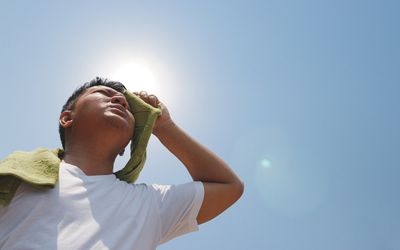Be aware of extensive sun exposure’s negative effects
TDT | Manama
The Daily Tribune – www.newsofbahrain.com
Bahrain is a hot and sunny country, so residents must take the necessary safety precautions when outside in the sun. It is important to note that the production of vitamin D is the only established benefit of solar UV exposure, and the amount of vitamin D production in an individual’s skin depends on variables such as geographic latitude, season, time of day, weather conditions, air pollution, and surface reflection.
Whilst sun exposure produces vitamin D, which can benefit your health by regulating the absorption of calcium and phosphorus, facilitating a normal immune system, and helping the development of growth bones and teeth, there are many consequences that outweigh the benefit of production of vitamin D.
There are other ways to produce vitamin D instead of spending time in the sunlight. Consuming fatty fish and seafood, including egg yolks in your diet, and taking supplements are great ways to incorporate vitamin D into your diet, whilst not increasing the risk of skin aging and skin cancers.
Dr Sithara Sreedharan, a specialist dermatologist at Al Hilal Hospital, told The Daily Tribune: “Extensive sun exposure on the skin can have both immediate and delayed effects.
“Some of the immediate effects can include erythema or redness on the surface of your skin, pigmentation or tanning, suppression of acquired immunity of skin, and a mild reduction of blood pressure via release of nitric oxide from the skin into the systemic circulation.
“Being in the sun for an extended amount of time can increase the incidence of skin cancers like squamous cell carcinoma (SCC), basal cell carcinoma (BCC), and malignant melanoma.”
Another effect of extensive sun exposure is the occurrence of photoaging, which is the superposition of structural and functional changes caused by chronic UVR. This can produce fine and coarse wrinkling, dryness, yellowness, and irregular patchy pigmentation.
“These effects are mainly attributed to the degradation of collagen and elastin in the dermis by UVR,” said Dr Sithara. How can individuals take precautions regarding sun exposure? Let’s take a look. Dr Sithara said: “Sun avoidance, seeking shade when outside, the use of protective clothing, and the application of sunscreen, hats, sunglasses, and makeup can act as measures to reduce your chances of damaging your skin through extensive sun exposure.
“Sunscreens that cover both UVB and UVA spectrum are required to be applied at the right frequency and amount to prevent skin damage. A liberal uniform film of sunscreen, 2gm/ cm2 needs to be applied every four hours to ensure good photo protection.”
Additionally, Dr Sithara urged individuals to avoid tanning beds, and sunbathing as it can increase the incidence of skin cancers. She added: “The use of antioxidants containing nutritional supplements can also be systemic photoprotection.”
Essentially, spending time outdoors at the beach or pools can be a great way to relax, whilst spending time with friends and family. However, it is essential that individuals are aware of the negative effects of the sun, and are able to take the necessary precautions to make time in the sun safe and enjoyable.
Related Posts

